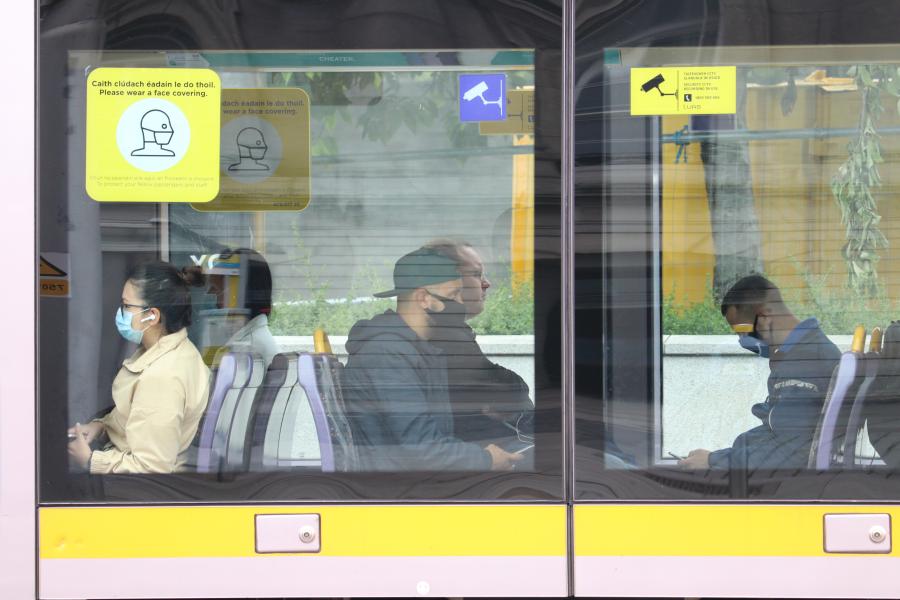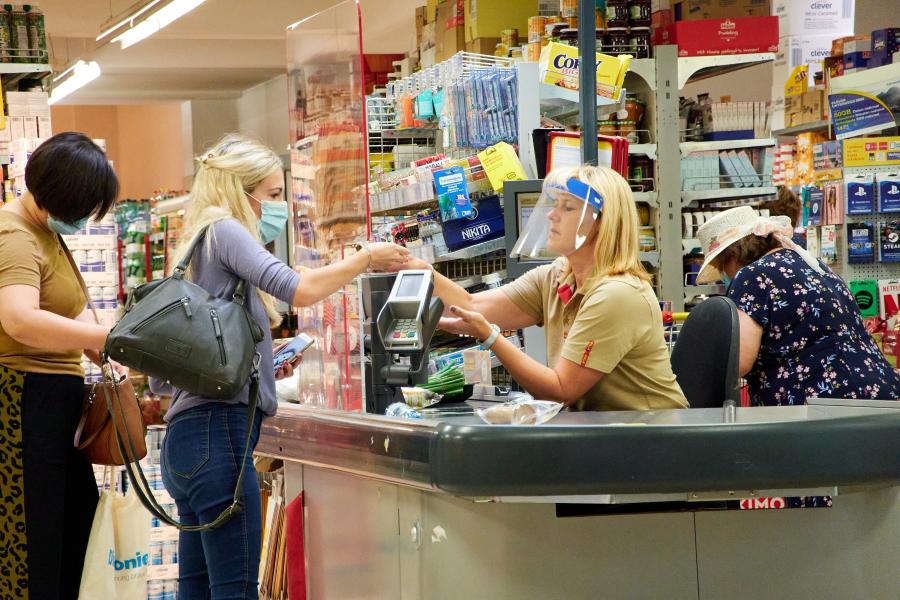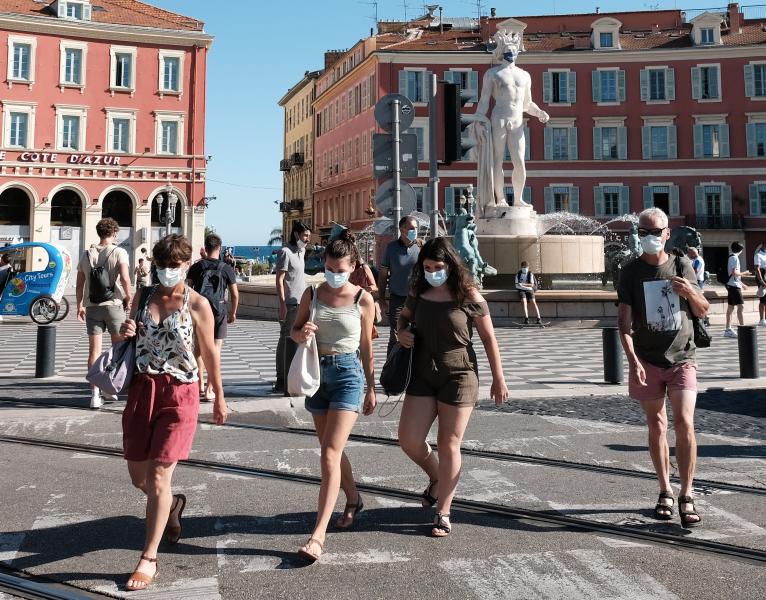--The soaring new cases have sounded alarm bells over a second wave of COVID-19 infections, and pose a dilemma for countries over how to strike the fragile balance between reopening the economy and preventing a further spread of the pandemic.
-- As for Europe, Spain, Belgium, Italy, France and Britain, which are among the continent's worst-hit countries, are suffering increases of cluster cases, though not as seriously as in March and April.
-- Failure to strictly follow preventive measures, eagerness to reopen economies and lack of government efforts have led to a new resurgence of infections, forcing several regions toward lockdown and curfew.
BEIJING, Aug. 6 (Xinhua) -- Many countries across the globe have witnessed a resurgence of COVID-19 infections over recent weeks.
According to the latest tally by Johns Hopkins University, global cases of COVID-19 reached 18.7 million as of Wednesday, only about 40 days after crossing the grim 10 million mark.
The soaring new cases have sounded alarm bells over a second wave of COVID-19 infections, and pose a dilemma for countries over how to strike the fragile balance between reopening the economy and preventing a further spread of the pandemic.

People wearing face masks are seen at a shopping mall in Frankfurt, Germany, July 7, 2020. (Xinhua/Lu Yang)
CASELOAD FLARE-UP
The United States has recorded more than 4.8 million cases with 158,171 deaths as of Wednesday, making it by far the worst-hit country in the world, according to data from the Center for Systems Science and Engineering (CSSE) at Johns Hopkins University.
The coronavirus pandemic has seen a resurgence in many U.S. states since June, particularly in the south and west of the country.
California, the hardest-hit state, has recorded 527,074 cases, followed by Florida with 502,739 cases, Texas with 466,032 cases and New York with 418,225 cases.
States with over 180,000 cases also include Georgia, Illinois, New Jersey and Arizona, CSSE data showed.
Brazil recorded on Wednesday a total of more than 2.8 million cases and 97,256 deaths.
The state of Sao Paulo, Brazil's most populous state, is the epicenter of the national outbreak, with 585,265 infections and 24,109 deaths.
Total coronavirus cases continued to leap in India on Wednesday, which surpassed the 1.9 million mark with 52,509 new COVID-19 cases detected in the past 24 hours and the total death toll of 39,795.
As for Europe, Spain, Belgium, Italy, France and Britain, which are among the continent's worst-hit countries, are suffering increases of cluster cases, though not as seriously as in March and April. Countries in southeastern Europe, such as Albania, Bulgaria and Romania, are seeing higher case numbers in July than those seen earlier in the year.

People wearing face masks are seen on a tram in Dublin, Ireland, July 13, 2020. (Xinhua)
TOO EARLY TO PUSH PREMATURE REOPENING
U.S. top infectious disease expert Anthony Fauci said at the end of July that an incomplete shutdown is among the factors contributing to surging COVID-19 cases in the country.
"If you look at what happened in Europe, when they shut down or locked down or went to shelter in place ... they really did it to the tune of about 95 percent plus of the country," the director of the U.S. National Institute of Allergy and Infectious Diseases said.

A police officer asks people who enter the Old Town to wear masks in Bucharest, Romania, Aug 5, 2020. (Photo by Gabriel Petrescu/Xinhua)
"When you actually look at what we did ... we really functionally shut down only about 50 percent in the sense of the totality of the country," he said.
He also noted that some states had better success at following reopening guidelines than others. "Some were followed very carefully and some were not."
In some situations, states did not abide strictly by the guidelines that the task force and the White House had put out and others that did abide by it, the people in the state actually were congregating in crowds and not wearing masks, Fauci said.
Gina Tambini, representative in Colombia of the Pan American Health Organization, stressed the need to take into account the diverse environments of each city in each country, and recommended lockdown measures not be relaxed until the speed of transmission is brought under control.
"Local and national governments must allow the dynamics of transmission to dictate their timeline for establishing measures and reopening. The goal is to flatten the curve and then significantly reduce it before relaxing any restrictions," she said.

Customers wearing face masks shop at a supermarket in Vienna, Austria, July 24, 2020.(Photo by Georges Schneider/Xinhua)
FAILURE TO FOLLOW PREVENTIVE MEASURES
Outside the U.S., failure to strictly follow preventive measures, eagerness to reopen economies and lack of government efforts have led to a new resurgence of infections, forcing several regions toward lockdown and curfew.
The British government has paused the further easement of lockdown measures in Blackburn with Darwen and Luton, while local government in India's southern state of Tamil Nadu has announced an extension of its partial lockdown through Aug. 31.

Visitors wearing face masks are seen during the press viewing of the National Gallery post lockdown in London, Britain, July 4, 2020. (Xinhua/Han Yan)
On July 26, Iraq's Higher Committee for Health and National Safety decided to extend the weekly full curfew from July 30 to Aug. 9, while the Africa Centers for Disease Control and Prevention said on July 28 that due to the rapid spread of the virus, 34 African countries are under full border closure, 13 are under national lockdown, 22 are under partial lockdown, and 34 are under night-time curfew.
Last week, French Health Minister Olivier Veran called on people to strictly comply with barrier gestures and social-distancing rules after the country saw a spike of daily coronavirus infections.
"Some people do not respect the rules. We must not relax now," Veran told LCI television.

People wearing face masks walk on the street in central Nice, southern France,(Photo by Serge Haouzi/Xinhua)
In an alarming report published on Tuesday, the country's scientific council said that a second wave was "highly likely" to arrive this autumn or winter, urging people to avoid social gatherings and respect barrier measures.
"The virus is circulating actively with an increased absence of distancing and barrier measures," the council said, recommending better access to tests to rapidly trace and isolate cases and stricter control on travelers from countries "at risk."
Spain is also struggling to control a series of new outbreaks of COVID-19 following the easing of lockdown restrictions on June 21, with cases mostly detected in patrons of bars and nightclubs, as well as in seasonal crop pickers.
In late July, the Catalan regional government ordered a curfew on all bars and nightclubs in the region, but youngsters continue to gather in large groups on the streets.

Portuguese President Marcelo Rebelo de Sousa (L, front) and Portuguese Prime Minister Antonio Costa (R, front) visit the Volkswagen Autoeuropa car factory in Palmela, Portugal, May 13, 2020.(Photo by Pedro Fiuza/Xinhua)
Sweden, with a population of over 10 million, has so far reported 81,181 infections and 5,747 deaths; however, the country has neither imposed a lockdown, even during the peak of the pandemic, nor asked people to wear face masks in public.
Anders Tegnell, Sweden's state epidemiologist at the Public Health Agency, told Swedish Radio on Tuesday that Sweden would not recommend the use of face masks, as the agency was still waiting for more research results supporting their effectiveness in reducing the spread of COVID-19.
(Xinhua reporters Yang Xiaohong in Prague, Liu Fang in Paris, Wen Xinnian in Lisbon, Zhang Qi in Dublin, Shi Zhongyu in Belgrade, Chen Jin in Bucharest, Pan Geping in Brussels, Dai Lei in London, Zhao Feifei in Vienna, Tian Ying in Berlin, Zhang Zhang in Warsaw, Guo Mingfang in Vilnius, Yuan Liang in Budapest, Fu Yiming in Stockholm, Tan Jingjing, Yang Shilong in Washington, Cui Yuanlei in Mexico City, Zhang Jiawei in London, Wang Shoubao in Addis Ababa and Feng Junwei in Madrid contributed to the story.)
(Video reporters Zhao Yuchao, Han Chong,Yang Xiaohong)
(Video editor Zhao Xiaoqing)



